
Tottenham Hotspur Football Club,, is a professional football club based in Tottenham, North London, England. It competes in the Premier League, the top tier of English football. The team has played its home matches in the Tottenham Hotspur Stadium since 2019, replacing their former home of White Hart Lane, which had been demolished to make way for the new stadium on the same site.

Sir Henry Percy, nicknamed Hotspur or Harry Hotspur, was an English knight who fought in several campaigns against the Scots in the northern border and against the French during the Hundred Years' War. The nickname "Hotspur" was given to him by the Scots as a tribute to his speed in advance and readiness to attack. The heir to a leading noble family in northern England, Hotspur was one of the earliest and prime movers behind the deposition of King Richard II in favour of Henry Bolingbroke in 1399. He later fell out with the new regime and rebelled, and was slain at the Battle of Shrewsbury in 1403 at the height of his fame.
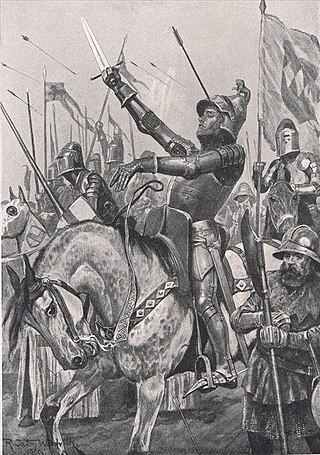
The Battle of Shrewsbury was fought on 21 July 1403, waged between an army led by the Lancastrian King Henry IV and a rebel army led by Henry "Harry Hotspur" Percy from Northumberland. The battle, the first in which English archers fought each other on English soil, reaffirmed the effectiveness of the longbow and ended the Percy challenge to King Henry IV of England.

Harry Potter and the Chamber of Secrets is a fantasy novel written by British author J. K. Rowling and the second novel in the Harry Potter series. The plot follows Harry's second year at Hogwarts School of Witchcraft and Wizardry, during which a series of messages on the walls of the school's corridors warn that the "Chamber of Secrets" has been opened and that the "heir of Slytherin" would kill all pupils who do not come from all-magical families. These threats are found after attacks that leave residents of the school petrified. Throughout the year, Harry and his friends Ron and Hermione investigate the attacks.

Edmund Mortimer, 5th Earl of March, 7th Earl of Ulster, was an English nobleman and a potential claimant to the throne of England. A great-great-grandson of King Edward III of England, he was heir presumptive to King Richard II of England when he was deposed in favour of Henry IV. Edmund Mortimer's claim to the throne was the basis of rebellions and plots against Henry IV and his son Henry V, and was later taken up by the House of York in the Wars of the Roses, though Mortimer himself was an important and loyal vassal of Henry V and Henry VI. Edmund was the last Earl of March of the Mortimer family.

Henry IV, Part 1 is a history play by William Shakespeare, believed to have been written not later than 1597. The play dramatises part of the reign of King Henry IV of England, beginning with the battle at Homildon Hill late in 1402, and ending with King Henry's victory in the Battle of Shrewsbury in mid-1403. In parallel to the political conflict between King Henry and a rebellious faction of nobles, the play depicts the escapades of King Henry's son, Prince Hal, and his eventual return to court and favour.

The title of Earl of Northumberland has been created several times in the Peerage of England and of Great Britain, succeeding the title Earl of Northumbria. Its most famous holders are the House of Percy, who were the most powerful noble family in Northern England for much of the Middle Ages. The heirs of the Percys, via a female line, were ultimately made Duke of Northumberland in 1766, and continue to hold the earldom as a subsidiary title.
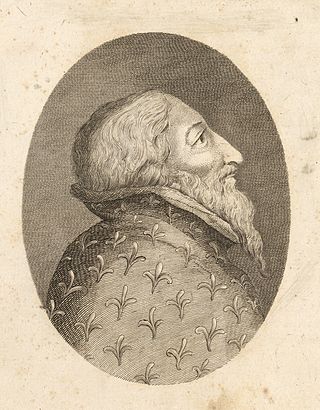
Henry Percy, 1st Earl of Northumberland, 4th Baron Percy, titular King of Mann, KG, Lord Marshal was the son of Henry de Percy, 3rd Baron Percy, and a descendant of Henry III of England. His mother was Mary of Lancaster, daughter of Henry, 3rd Earl of Lancaster, son of Edmund, Earl of Leicester and Lancaster, who was the son of Henry III.

Earl of Erroll is a title in the Peerage of Scotland. It was created in 1453 for Sir William Hay. The subsidiary titles held by the Earl of Erroll are Lord Hay and Lord Slains (1452), both in the Peerage of Scotland. The Earls of Erroll also hold the hereditary office of Lord High Constable of Scotland. The office was once associated with great power. The Earls of Erroll hold the hereditary title of Chief of Clan Hay.
Baron Strathalmond, of Pumpherston in the County of Midlothian, is a title in the Peerage of the United Kingdom. It was created on 18 February 1955 for the businessman Sir William Fraser. He was chairman of the Anglo-Persian Oil Company from 1941 to 1956. His son, the second Baron, was managing director of the Kuwait Oil Company and a director of BP and later chairman of Govan Shipbuilders. As of 2017 the title is held by the latter's son, the third Baron, who succeeded in 1976.

Baron Moncreiff, of Tulliebole in the County of Kinross, is a title in the Peerage of the United Kingdom. It was created on 9 January 1874 for the lawyer and Liberal politician Sir James Moncreiff, 1st Baronet. He had already been created a Baronet, of Kilduff in the County of Kinross, in the Baronetage of the United Kingdom on 23 May 1871. In 1883 Lord Moncreiff also succeeded his elder brother as 11th Baronet, of Moncreiff in the County of Perth. On his death the titles passed to his eldest son, the second Baron. He was a Judge of the Court of Session from 1888 to 1905 under the title of Lord Wellwood and served as Lord Lieutenant of Kinross-shire between 1901 and 1909. He was succeeded by his younger brother, the third Baron. He was a clergyman. As of 2010 the titles are held by the latter's great-grandson, the sixth Baron, who succeeded his father in 2002.
Four ships of the British Royal Navy have been named HMS Hotspur after the nickname of Sir Henry Percy:
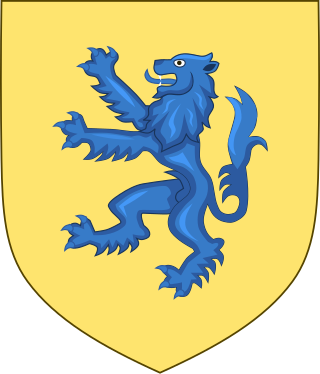
The Percy family is an English noble family. They were among the most powerful noble families in Northern England for much of the Middle Ages. The noble family is known for its long rivalry with the House of Neville, another family powerful in northern England during the 15th century. The Percy-Neville feud led to the Wars of the Roses, at the time known as the Civil Wars, in England.
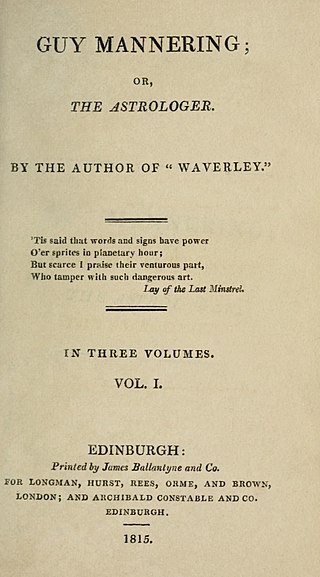
Guy Mannering; or, The Astrologer is the second of the Waverley novels by Walter Scott, published anonymously in 1815. According to an introduction that Scott wrote in 1829, he had originally intended to write a story of the supernatural, but changed his mind soon after starting. The book was a huge success, the first edition selling out on the first day of publication.
Baron Renwick, of Coombe in the County of Surrey, is a title in the Peerage of the United Kingdom. It was created on 23 December 1964 for the businessman and public servant, Sir Robert Renwick, 2nd Baronet. He notably worked for the Air Ministry and the Ministry of Aircraft Production during the Second World War. The Renwick Baronetcy, of Coombe in the County of Surrey, was created in the Baronetage of the United Kingdom on 28 June 1927 for his father, Harry Renwick. As of 2020 the titles are held by the first Baron's grandson, the third Baron, who succeeded in that year. The second baron was active in the House of Lords until the House of Lords Act 1999, when he lost his seat in parliament.
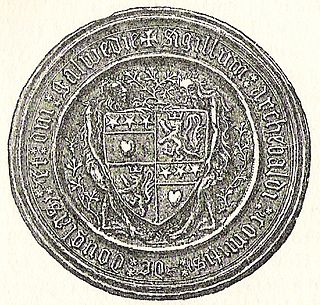
Archibald Douglas, 4th Earl of Douglas, Duke of Touraine, was a Scottish nobleman and warlord. He is sometimes given the epithet "Tyneman", but this may be a reference to his great-uncle Sir Archibald Douglas.
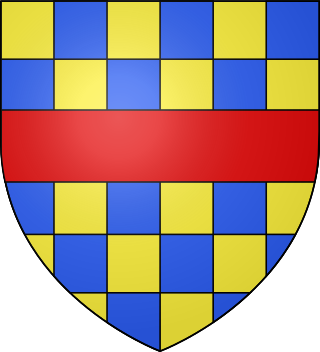
Thomas Clifford, 8th Baron de Clifford, also 8th Lord of Skipton, was the elder son of John, 7th Baron de Clifford, and Elizabeth Percy, daughter of Henry "Hotspur" Percy and Elizabeth Mortimer.
The Maxwell, later Stirling-Maxwell, later Maxwell Macdonald Baronetcy, of Pollok in the County of Renfrew, is a title in the Baronetage of Nova Scotia. It was created on 12 April 1682 for John Maxwell, with remainder to the heirs of the body. In 1707 he was given a new patent extending the remainder to heirs of entail in his lands and estates. Maxwell was Lord Justice Clerk of Scotland from 1699 to 1702, and Rector of the University of Glasgow from 1691 to 1718.
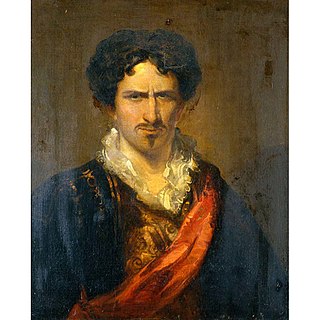
Sir Edmund Mortimer IV was an English nobleman and landowner who played a part in the rebellions of the Welsh leader Owain Glyndŵr and of the Percy family against King Henry IV, at the beginning of the 15th century. He perished at the siege of Harlech as part of these conflicts. He was related to many members of the English royal family through his mother, Princess Philippa, Countess of Ulster, who was a granddaughter of King Edward of Windsor.















